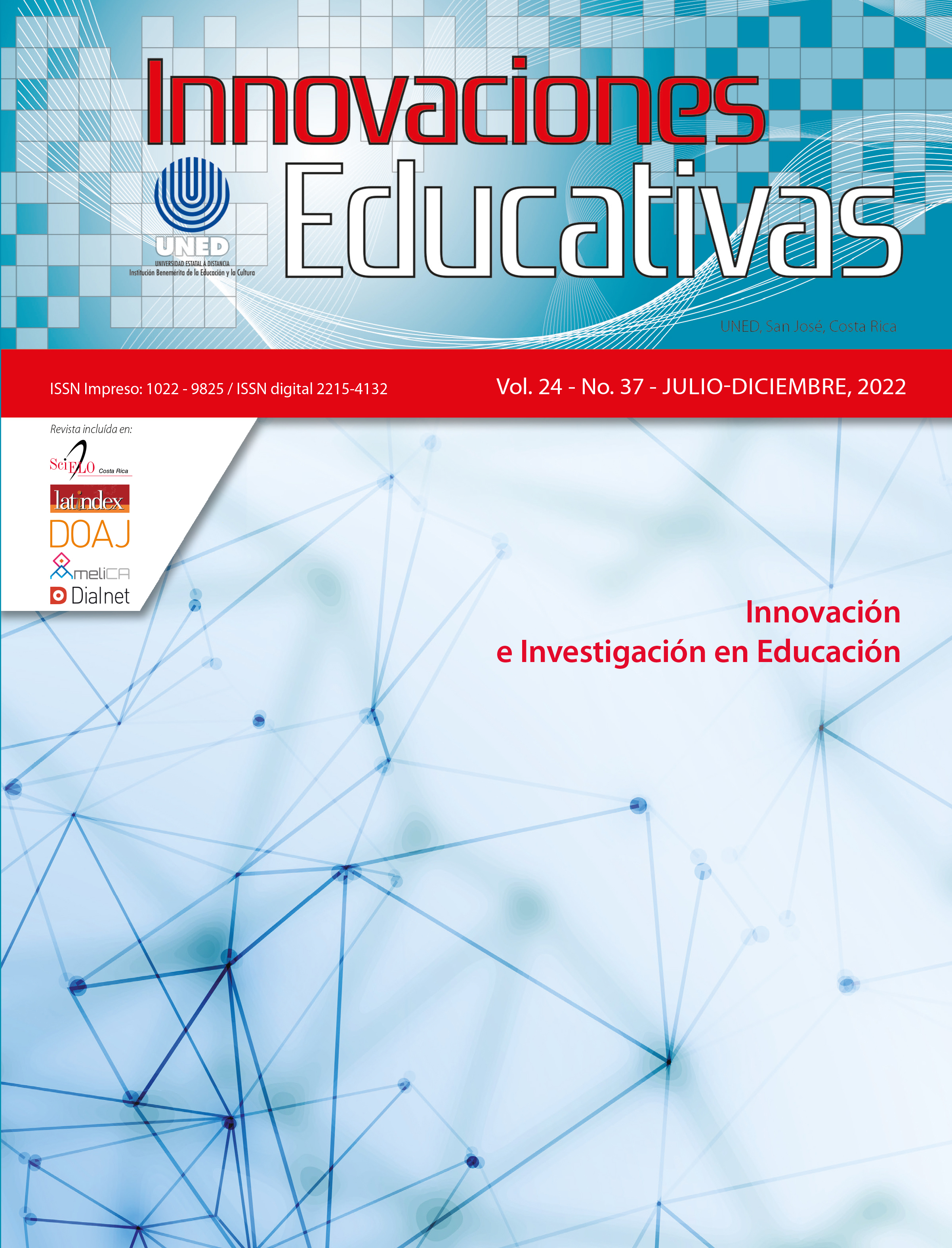Factores de la dimensión afectiva asociados a las reacciones frente evaluaciones en matemática: la experiencia de dos jóvenes estudiantes destacados académicamente
DOI:
https://doi.org/10.22458/ie.v24i37.3672Keywords:
evaluation, mathematics, beliefs, attitude, affective domain, learningAbstract
In this article, we identify a Chilean educational establishment in the Metropolitan Region of Santiago, where gender gaps were reverted in mathematics tests results. By exploring the affective factor on school performance and applying and analyzing the concomitance between the answers given in a survey that measures emotions and anxiety towards mathematics. The survey was applied to two academically gifted students (one male and one female) to determine the differences in their emotions regarding mathematicsrelated school activities. Subsequently, we interviewed the male student. Differences were identified in affective factors, as well as in this student’s experience during the mathematics evaluations in his school days, through analyzing his speech and using creative interpretation. The results concluded that different affective states are provoked among the participants facing the same school activities related to mathematics. Said differences were not associated with the level of self-efficacy, assessment or performance in mathematics expressed by the participants. In addition, insecurity not related to the content domain was detected when examining, in detail, the speech of the male participant.
References
Agencia de Calidad de la Educación ACE. (2021). Indicadores de desarrollo personal y social. https://www.agenciaeducacion.cl/otros-indicadores-de-calidad/
Agencia de Calidad de la Educación ACE (2020). Presentación de resultados educativos 2019. http://archivos.agenciaeducacion.cl/PPT_Nacional_Resultados_educativos_2019.
Agencia de la Calidad de la Educación (ACE). (2018). Factores asociados a los resultados educativos 2017, Santiago, Chile.
Agencia de la Calidad de la Educación (ACE). (2014). Metodología de construcción de grupos socioeconómicos, Santiago, Chile. http://archivos.agenciaeducacion.cl/Metodologia_de_Construccion_de_Grupos_Socioeconomicos_Simce_2013.pdf
Di Silvestri, C. (2015). Investigación cualitativa. Fundamentos y metodología. Pimoedit.
Eccius-Wellmann, C. y Lara-Barragán, A. (2016). Hacia un perfil de ansiedad matemática en estudiantes de nivel superior. Revista Iberoamericana de Educación Superior, 7(18), 109-129. https://www.redalyc.org/pdf/2991/299143567007.pdf
Edwards, R. y Holland, J. (2013). What is Qualitative Enterviewing? Research Methods Series. Graham Crow, University of Edinburgh.
Gairín, J. (1990). Las actitudes en educación. Un estudio sobre la educación matemática. Boixareu Universitaria.
Goldenberg, M. (1999). A arte de pesquisar: como fazer pesquisa qualitativa em Ciências Sociais. Record.
Gómez-Chacón, I. M. (2000). Matemática emocional. Los afectos en el aprendizaje matemático. Narcea.
Hambleton, R. K., Swaminathan, H. y Rogers, H. J. (1991). Fundamentals of Item Response Theory. Sage.
Hannula, M., Di Martino, P., Pantziara, M., Zhang, Q., Morselli, F., Heyd-Metzuyanim, H., Lutovac, S., Kaasila, R., Middleton, J., Jansen, A. y Goldin, G. (2016). Attitudes, Beliefs, Motivation, and Identity in Mathematics Education. An Overview of the Field and Future Directions. ICME-13 Topical Surveys. Springer International Publishing.
Joel, D., Berman, Z. y Tavor, D. (2015). Sex beyond the genitalia: The human brain mosaic. PNAS, 112(50). https://www.pnas.org/content/pnas/112/50/15468.full.pdf
March, D. (2009). Diferencias de género en el rendimiento académico. Efectos de la evolución a nivel escolar [Memoria para optar al título de Ingeniero Civil de Industrias, con Diploma en Ingeniería de Transporte. Universidad Católica de Chile].
Mato, M. D. (2006). Diseño y validación de dos cuestionarios para evaluar las actitudes y la ansiedad hacia las matemáticas en alumnos de educación secundaria obligatoria [Tesis doctoral]. Universidade da Coruña, Coruña.
Mineduc. (2016). Currículum en línea. http://www.curriculumenlineamineduc.cl/605/w3-propertyvalue-58244.html
Mizala, A., Martínez, S. y Martínez, F. (2015). Pre-service Elementary School Teachers’ Expectations about Student Performance: How their Beliefs are affected by their Mathematics Anxiety and Student’s Gender. Teaching and Teacher Education, 50(2015), 70-78. https://repositorio.uchile.cl/bitstream/handle/2250/133887/Pre-service-elementary-school-teachers-expectations.pdf?sequence=1&isAllowed=y
Muñoz, J.M. y Mato, M. D. (2008). Análisis de las actitudes respecto a las matemáticas en alumnos de ESO. Revista de Investigación Educativa, 26(1), 209-226. https://revistas.um.es/rie/article/view/94181
OECD. (2013). PISA 2012 Results: Ready to Learn (Volume III). PISA, OECD Publishing, Paris. https://www.oecd.org/pisa/keyfindings/pisa-2012-results-volume-III.pdf
OECD. (2014). PISA 2012 Results: What Students Know and Can Do – Student Performance in Mathematics, Reading and Science (Volume I). PISA, OECD Publishing. http://dx.doi.org/10.1787/9789264201118-en
OECD. (2019). PISA 2018 Results (Volume II): Where All Students Can Succeed. PISA, OECD Publishing, Paris. https://doi.org/10.1787/19963777
Santander, P. (2011). Por qué́ y cómo hacer análisis de discurso. Cinta de Moebio: Revista de Epistemología de Ciencias Sociales, 41, 207-224. https://www.moebio.uchile.cl/41/santander.html
Sarabia, A. y Iriarte, C. (2011). El aprendizaje de las matemáticas. ¿Qué actitudes, creencias y emociones despierta esta materia en los alumnos? EUNSA.
Taylor S. J. y Bogdan, R. (1984). Introducción a los métodos cualitativos de investigación. La búsqueda de significados. Paidós.
Vargas, C. y Matus C. (2021). Brechas persistentes de género en matemáticas en las pruebas nacionales chilenas SIMCE (PRE-PRINT).
Vargas, C. (2021). Resultados de género en la aplicación de un test dual de diagnóstico con base en las nociones básicas y la ansiedad matemática en estudiantes de primer año de universidad. Aportes para la articulación entre teoría y práctica en la educación matemática. Editorial Graó.
Vucovic, R. (2013). Mathematics anxiety in young children: Concurrent and longitudinal associations with mathematical performance. Contemporary Educational Psychology, 38, 1–10. https://nyuscholars.nyu.edu/en/publications/mathematics-anxiety-in-young-children-concurrent-and-longitudinal
Downloads
Published
How to Cite
Issue
Section
License
Copyright (c) 2022 Innovaciones Educativas

This work is licensed under a Creative Commons Attribution-NonCommercial-NoDerivatives 4.0 International License.

